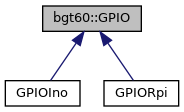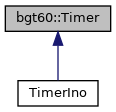
Data Structures | |
| class | bgt60::GPIO |
| class | bgt60::Timer |
Functions | |
| virtual Error_t | bgt60::GPIO::init ()=0 |
| Initializes the GPIO. | |
| virtual Error_t | bgt60::GPIO::deinit ()=0 |
| Deinitializes the GPIO. | |
| virtual VLevel_t | bgt60::GPIO::read ()=0 |
| Reads the GPIO voltage level. | |
| virtual Error_t | bgt60::GPIO::write (VLevel_t level)=0 |
| Writes the GPIO output voltage level. | |
| virtual Error_t | bgt60::GPIO::enable ()=0 |
| Enables the GPIO output according to the GPIO logic. | |
| virtual Error_t | bgt60::GPIO::disable ()=0 |
| Disables the GPIO output according to the GPIO logic. | |
| virtual Error_t | bgt60::GPIO::enableInt (void(*cback)(void), IntEvent_t mode)=0 |
| Enables the GPIO hardware interrupt. | |
| virtual Error_t | bgt60::GPIO::disableInt ()=0 |
| Disables the GPIO hardware interrupt. | |
| virtual IntEvent_t | bgt60::GPIO::intEvent ()=0 |
| Gets the latest interrupt event. | |
Interrupt event | |
| enum | bgt60::GPIO::IntEvent_t { bgt60::GPIO::INT_FALLING_EDGE = 0 , bgt60::GPIO::INT_RISING_EDGE = 1 , bgt60::GPIO::INT_HIGH = 2 , bgt60::GPIO::INT_LOW = 3 , bgt60::GPIO::INT_CHANGE = 4 } |
Voltage level | |
| enum | bgt60::GPIO::VLevel_t { bgt60::GPIO::GPIO_LOW = 0 , bgt60::GPIO::GPIO_HIGH = 1 } |
Voltage logic | |
| enum | bgt60::GPIO::VLogic_t { bgt60::GPIO::NEGATIVE = 1 , bgt60::GPIO::POSITIVE = 2 } |
| class bgt60::GPIO |

Public Types | |
Interrupt event | |
| enum | IntEvent_t { INT_FALLING_EDGE = 0 , INT_RISING_EDGE = 1 , INT_HIGH = 2 , INT_LOW = 3 , INT_CHANGE = 4 } |
Voltage level | |
| enum | VLevel_t { GPIO_LOW = 0 , GPIO_HIGH = 1 } |
Voltage logic | |
| enum | VLogic_t { NEGATIVE = 1 , POSITIVE = 2 } |
Public Member Functions | |
| virtual Error_t | init ()=0 |
| Initializes the GPIO. | |
| virtual Error_t | deinit ()=0 |
| Deinitializes the GPIO. | |
| virtual VLevel_t | read ()=0 |
| Reads the GPIO voltage level. | |
| virtual Error_t | write (VLevel_t level)=0 |
| Writes the GPIO output voltage level. | |
| virtual Error_t | enable ()=0 |
| Enables the GPIO output according to the GPIO logic. | |
| virtual Error_t | disable ()=0 |
| Disables the GPIO output according to the GPIO logic. | |
| virtual Error_t | enableInt (void(*cback)(void), IntEvent_t mode)=0 |
| Enables the GPIO hardware interrupt. | |
| virtual Error_t | disableInt ()=0 |
| Disables the GPIO hardware interrupt. | |
| virtual IntEvent_t | intEvent ()=0 |
| Gets the latest interrupt event. | |
| class bgt60::Timer |

Public Member Functions | |
| virtual Error_t | init ()=0 |
| Initialiazes the timer. | |
| virtual Error_t | deinit ()=0 |
| Deinitialiazes the timer. | |
| virtual Error_t | start ()=0 |
| Starts the timer. | |
| virtual Error_t | elapsed (uint32_t &elapsed)=0 |
| Elapsed time since the timer was started in milliseconds. | |
| virtual Error_t | elapsedMicro (uint32_t &elapsed)=0 |
| Elapsed time since the timer was started in microseconds. | |
| virtual Error_t | stop ()=0 |
| Stops the timer. | |
| virtual Error_t | delay (const uint32_t timeout)=0 |
| Introduces a delay during the specified time. | |
|
pure virtual |
Deinitialiazes the timer.
| OK | if success |
Implemented in TimerIno.
Elapsed time since the timer was started in milliseconds.
| [out] | elapsed | Time in milliseconds |
| OK | if success |
Implemented in TimerIno.
Elapsed time since the timer was started in microseconds.
| [out] | elapsed | Time in microseconds |
| OK | if success |
Implemented in TimerIno.
|
pure virtual |
|
pure virtual |
|
pure virtual |